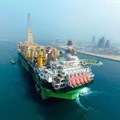In a ministerial panel discussion at the Continental Energy Investment Forum 2024 held at the CTICC, government officials from across Africa shared their insights and strategies regarding the continent's energy transition, shedding light on the complexities and opportunities that lie ahead. The panel included representatives from Nigeria, Zambia, the Democratic Republic of Congo (DRC), and Sierra Leone, each presenting their unique challenges and approaches to balancing energy security with sustainable development.

The Continental Energy Investment Forum 2024 brought together the Africa Energy Colloquium.
Nigeria's representative, Labode Sowunmi, a consultant to the Parliamentary on gas and power, led with the Afrocentric approach that African countries should use their indigenous gas as a bridge in the energy transition.
"We are going to use gas as our vehicle to energy transition," he stated, highlighting the government's four priority areas: gas to power, gas to industry, gas for cooking, and gas infrastructure projects.
Camillus Eboh 23 Nov 2023 One notable project is the Ajaokuta–Kaduna–Kano (AKK) pipeline, which aims to provide a competitive advantage in the global gas market.
Sowunmi, not a stranger to controversial statements acknowledged the moral and practical dilemmas facing Nigeria.
"The idea that producing energy can destroy the planet has led to the thinking of energy transition into more sustainable forms of energy," he explained.
However, he also pointed out the disproportionate burden placed on Africa to meet global targets, despite the continent's minimal contribution to pollution.
Sustainability conundrum
A significant point of contention within Nigeria's energy strategy is the involvement of Dangote Industries in oil refining.
Critics argue that this focus on oil contradicts the country's commitment to sustainability.
"Dangote's massive oil refinery project, while boosting local production and reducing imports, still ties Nigeria to fossil fuels, hindering progress towards cleaner energy," said Sowunmi of his countryman.
This sentiment reflects broader concerns about the balance between economic development and environmental responsibility.
Zambia’s Minister of Infrastructure, Housing and Urban Development, Charles Milupi, discussed the country's efforts to mitigate energy shortages exacerbated by severe droughts.
"We are currently producing less than needed, which affects industrial and agricultural activities," he noted.
Zambia is investing in 300MW of coal power to power the mining industry and rapidly expanding solar power generation for civil consumption.
The government has liberalised the energy sector and introduced incentives such as duty-free imports of solar panels to encourage private sector participation.
But this comes as Kariba Dam – 85% of Zambia’s energy mix – reaches record low output because of the drought.
"We are moving forward by increasing our power generation capacity and diversifying our energy mix," Milupi said, speaking to the need for competitive advantages in solar power and the role of private-public partnerships.
Modernise energy infrastructure
The DRC director general for electricity, Marco Muya, spoke of his country’s ambition to modernise its energy infrastructure and prioritise sources available domestically, while also considering energy export opportunities to neighbouring countries.
“We will invest in our infrastructure to empower our people, but we also need cash,” he said.
Dr Kandeh Yumkella, former UN special representative for the secretary general of sustainable energy, provided a broader perspective on Africa's energy transition.
For us, the energy transition in Africa is about ensuring affordable, reliable energy access and supply
Sierra Leone is focusing on integrating solar and hydro power, building climate resilience, and enhancing energy governance to attract investment.
"Our planning must go beyond political cycles; energy transitions are long-term processes," Dr Yumkella stressed.
He called for increased investment in pre-development stages of energy projects to create a pipeline of bankable projects, as well as clear and transparent regulations to foster private sector confidence.
Continental consensus
The consensus among these African leaders is clear: while the continent faces significant challenges in transitioning to sustainable energy, there are also immense opportunities.
By leveraging diverse energy sources, enhancing infrastructure, and fostering regional cooperation, Africa can navigate its unique path towards energy security and sustainability.
"Energy is central to our structural transformation and industrialisation,” concluded Dr Yumkella.
“Without affordable, reliable energy, we cannot achieve the 21st-century industrial revolution that Africa needs."

















































